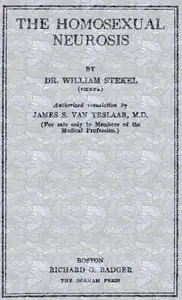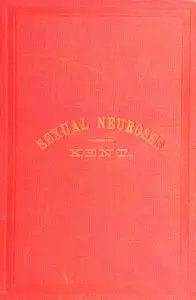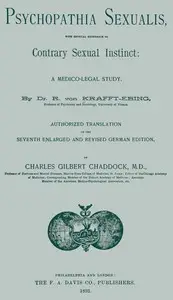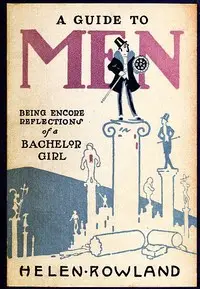"The Homosexual Neurosis" by Wilhelm Stekel is an exploration into the then current scientific understanding of homosexuality, investigating the impacts of family, personal events, and the way sexual attraction works, at the beginning of the 20th century. It is set out to clarify uncertainties related to homosexual actions including its neurological or emotional reasons. The translator’s preface highlights Stekel's research in Freudian psychoanalysis while the early discussions reveal fears, disgust, and aversions that homosexuals may experience when dealing with the opposite sex, as well as relating different neuroses and the variety of sexual encounters tied to sexuality. The book starts to illustrate different concepts and discoveries about psychological obstacles, eventually affecting sexual preference.

The Homosexual Neurosis
By Wilhelm Stekel
Venture into the complex psychological underpinnings of same-sex attraction, set against a backdrop of early 20th-century scientific thought, where societal norms and personal experiences shape the landscape of sexual preference.
Summary
About the AuthorWilhelm Stekel was an Austrian physician and psychologist, who became one of Sigmund Freud's earliest followers, and was once described as "Freud's most distinguished pupil". According to Ernest Jones, "Stekel may be accorded the honour, together with Freud, of having founded the first psycho-analytic society". However, a phrase used by Freud in a letter to Stekel, "the Psychological Society founded by you", suggests that the initiative was entirely Stekel's. Jones also wrote of Stekel that he was "a naturally gifted psychologist with an unusual flair for detecting repressed material". Freud and Stekel later had a falling-out, with Freud announcing in November 1912 that "Stekel is going his own way". A letter from Freud to Stekel dated January 1924 indicates that the falling out was on interpersonal rather than theoretical grounds, and that at some point Freud developed a low opinion of his former associate. He wrote: "I...contradict your often repeated assertion that you were rejected by me on account of scientific differences. This sounds quite good in public but it doesn't correspond with the truth. It was exclusively your personal qualities—usually described as character and behavior—which made collaboration with you impossible for my friends and myself." Stekel's works are translated and published in many languages.
Wilhelm Stekel was an Austrian physician and psychologist, who became one of Sigmund Freud's earliest followers, and was once described as "Freud's most distinguished pupil". According to Ernest Jones, "Stekel may be accorded the honour, together with Freud, of having founded the first psycho-analytic society". However, a phrase used by Freud in a letter to Stekel, "the Psychological Society founded by you", suggests that the initiative was entirely Stekel's. Jones also wrote of Stekel that he was "a naturally gifted psychologist with an unusual flair for detecting repressed material". Freud and Stekel later had a falling-out, with Freud announcing in November 1912 that "Stekel is going his own way". A letter from Freud to Stekel dated January 1924 indicates that the falling out was on interpersonal rather than theoretical grounds, and that at some point Freud developed a low opinion of his former associate. He wrote: "I...contradict your often repeated assertion that you were rejected by me on account of scientific differences. This sounds quite good in public but it doesn't correspond with the truth. It was exclusively your personal qualities—usually described as character and behavior—which made collaboration with you impossible for my friends and myself." Stekel's works are translated and published in many languages.















